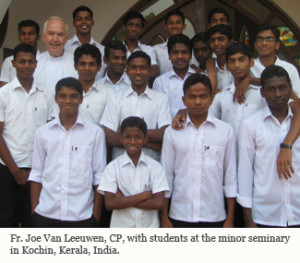Reflection:
The scriptural readings assigned for today display a marked interest in the role of sin in our lives. But there’s a somewhat unique or different pattern in the presentation we have before us. There’s a bit of a sly approach to the topic. Instead of focusing exclusively on the ugliness or distortedness of sin, it opts rather to present it largely in terms of the background of attractiveness with which it can be contrasted. This occurs along the line of “correction” techniques a parent might take with a child who has just done something wrong. Instead of dealing with the selfishness or meanness the child has displayed in opting to do something, our readings for the day would suggest pointing out how contrary our behavior has been over against the background of the many good things we have received from God, much as a parent might take the child on his or her lap, not to spank the boy or girl, but to remind him or her of how many good things the parent has done for the little one, to impart a sense of shame for doing something so contrary to the thoughtfulness he or she has received from the mother or father over the past few weeks or months.
This is the path St. Paul has chosen to pursue in the selection from his letter to the members of the church in Rome. He is obviously displeased with the course of action they have chosen to follow against the background of the favors God has bestowed on them. But he doesn’t “throw the book at them”. Rather, he reminds them of being under the grace of God and having been raised from death to the life of grace. They were on the way to being obedient to the teaching Paul had imparted to them. But they have “blown” their opportunity, and suffered a significant loss as a result.
So Paul chooses to work on the good things they are jeopardizing rather than on the evil they have chosen to do. And Luke, in the gospel he presents today, follows much the same pattern in pointing out the path for his readership to follow. He compares the recipients of his gospel to servants who have received a set of directions on what to do during the absence of the owner of an establishment where they work. The owner or manager is aware that trouble might develop in the household during this period of time, and he wants them to be prepared to deal with it when it occurs, by assigning them responsibilities. And when a disturbance does occur on or around the property, traceable to the servants themselves, then the owner wants them to know they will suffer the consequences of this, which, however will be meted out fairly, depending on the degree of responsibility they bear in the hierarchy of duties the master gave them. But here again, the focus is less on the nature of the wrong the servants committed, and more on the goodness of the owner in awarding them various gifts and favors, which they have disregarded and even disparaged. It’s not so much the evil done but the good forgotten and abused that stands at the heart of this story.
So this is instructive for us in assessing our own standing before God. We had better prepare ourselves for our encounter with Him by focusing more on the favors from Him we have neglected, than by trying to recall the ugly ways we have chosen to follow. It’s a bit like trying to train a young animal the “rules of the house”, either by punishing the pup or kitten for every violation of the rule, or by awarding the young ones in training each time they keep those rules. The day’s scriptures seem to favor the latter approach more than the former. It is interesting to note how this corresponds to the last judgment scene presented in Mt 25.31, ff., where the focus is less on the evil we have deliberately pursued in the course of our lives, and more on the good we have failed to perform when we had the opportunity. The repulsiveness of evil is less cogent than the attractiveness of goodness. This is a helpful hint for us to note as we prepare for that momentous day ahead of us.
Fr. Sebastian MacDonald, C.P. is a member of the Passionist formation community at Catholic Theological Union, Chicago.








